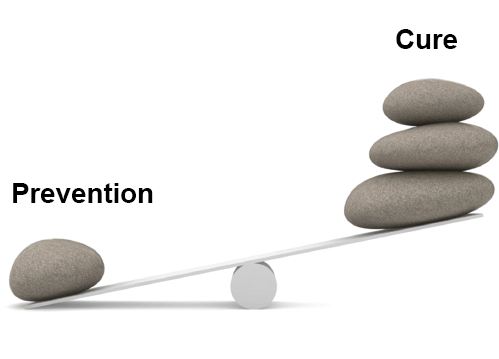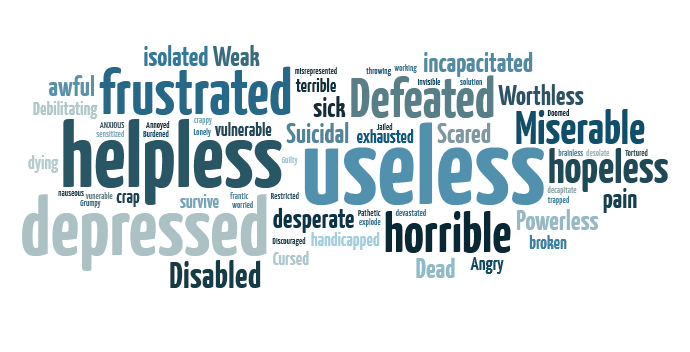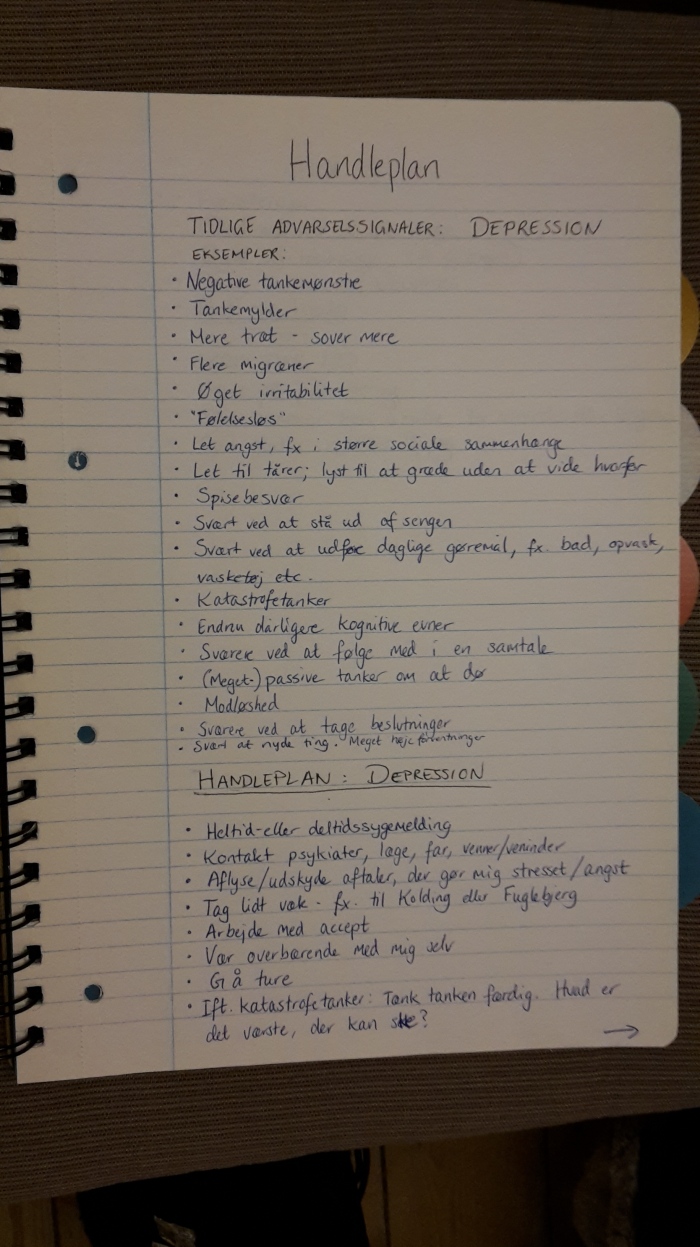Don’t feel like reading? Listen to the audio version here:
When the life you had planned
Slowly slips through your hands
When it feels like you just slept through all the best years of you’re life
When you can’t find your way
When each day ends the same
When you’ve lost the fight inside of you
Is there anything worth holding on to– Cynthia Erivo, Anything Worth Holding Onto

Let me start by activating your imagination.
Most of you know what it’s like. It’s dark. It’s cold. It seems impossible for you to get out of bed. A long day ahead of you. If you could just have five more minutes…
… But no. You must. You must get up and go about your business. You may have overslept, maybe you have to rush, but the darkness did not prevail.
Most of us know what this is like.
Now, imagine this was every morning for a week. Two weeks. A month. Six months. A year. It’s not even cold outside anymore; the sun is shining. But you just can’t get up.
Now add some negative thoughts. “I’m useless,” “life is pointless,” “I hate myself,” “I’m not doing anything today, so what’s the point of getting up,” or “There’s just too much, today is too much, I can’t, I just can’t.” “Why can’t I just disappear?”
Now add a feeling of heaviness in your body. It’s hard to move; every movement is a struggle and requires enormous efforts. You feel 90 years old. And you’re just… so… tired.
Now imagine not getting up until evening. Maybe you can get yourself to eat something. You feel terrible for staying in bed all day. And you’re still so damn tired.
I could go on, but let’s hold it there for now. What I have just described are classic symptoms of depression. And these also happen to be some of my earliest “warning signals,” a.k.a. the first signs that I might be headed into a depression.
The point I’m trying to make is that it’s normal to have a hard time getting out of bed sometimes. Especially during the Nordic wintertime (am I right?). But for people suffering from periods of depression, it’s super important that we learn how to figure out when it’s “normal,” and when it might be early symptoms of depression.
I’ve been through an amazing treatment program at Rigshospitalet (a highly specialized hospital in Denmark), at the Kompetencecenter for Affektive Lidelser. I learned so much about my own personal illness, e.g. what my early warning signals are, what triggers the different episodes, and making a prevention plan for when they might be building up. I’ve done other courses as well, expanding on all of the above. I’ve even managed to actually prevent a depressive episode from developing further than the early stages, which was a HUGE accomplishment for me. It has not been easy, and it still isn’t. It’s almost constant work. But it’s working!
My strategies
Let me share some of the best strategies I’ve used – and still use, to prevent a full-blown depressive episode. They obviously take time and practice, just like anything else. I haven’t perfected any of them, and I probably never will, but I have them, and I try my best to use them.
I use at least 4 or 5 of the listed strategies in my daily life, regardless of any sign of early symptoms. It’s called prevention, my friends, and when you suffer from something that does not have a cure, you gotta do your very best to prevent future episodes in any way you can.
Let’s get to it!
1: Keep track
I use a mood tracking chart similar to this one:
![]()
Here’s the mood tracker in PDF-format:
Mine is in Danish and more colorful:

We used these in the treatment program at the hospital. Back then, we had to fill out almost all of the boxes every day. But now that it’s just for my own personal use (monitored by my psychiatrist, of course), the only relevant ones for me are “stemningsleje” (mood), anxiety, and sleep. This way, I can keep track of any major changes that might occur, and prevent a potential episode.
Other great mood trackers come in the form of the people around you. If you have someone that you see regularly, preferably also someone who’s experienced both your highs and your lows, tell them about your early warning signs of an episode, and ask them to just be aware of any potential future mood changes. I think it’s important that it’s someone who knows you quite well, though. Otherwise they might mistake one bad day for a depression.
2: Get to know your symptoms

A good place to start is to make a list of every symptom of depression that you’ve experienced. Then, try to pick out the ones that are typically the first to occur, as far as you can remember. Some of my earliest symptoms are: more negative thoughts, I sleep longer than usual, I have less energy, and I don’t feel like doing anything.
Take your time and really think about what they are, and how to recognize them.
Let’s say I’m stabilized, or “neutral,” and these symptoms start showing. I recognize them and am aware of them. If I have one or more of the abovementioned symptoms for a day or two, it’s fine. If it goes on longer than that, then, as a precaution, I take action.
3: Make a plan
I recommend filling out a sort of “plan of action.” It could look something like this:

Here’s the WORD-file:
I also have all my plans written down in designated notebooks or on pieces of paper in folders. I definitely recommend having these in physical form. So in my notebook, it looks like this:

I know. You’re probably thinking: what the hell kind of language is that??? Fear not. It’s just Danish. Allow me to go through it with you.
So first, I’ve written down examples of early signs of depression. Negative thoughts and sleeping more are at the top of the list. These are relatively easy to notice for me, as I, as previously mentioned, try to track my sleeping pattern and my mood. Other examples include:
Anxiety
Increased irritability
More migraines
Difficulty eating when I’m by myself
Doubting myself and all of my decisions
Catastrophic/all-or-nothing thoughts
etc.
My plan of actions and strategies (I’ve added some from other pages of my notebook):
- Contact phychiatrist, GP, dad, friends
- Start writing symptoms down and try to grade the severity from 1-5, where 5 is the worst.
- Cancel/postpone appointments that make me stressed/anxious
- Perhaps full- or part time sick leave
- Go away for a bit; e.g. take a trip to Kolding (I have friends there) or Fuglebjerg (my sister, brother-in-law and nephew live there)
- Logical thinking: asking myself logical questions in certain situations, and then turn to others for validity.
- Work with accepting the fact that it’s there, and take it seriously.
- Indulge myself
- Go for walks
- In relation to the catastropohic/all-or-nothing thoughts:
Think the thought through to the end. What’s the worst that can happen? (So far, it’s never been nearly as bad as my depression tries to convince me it is.) - If I have started sleeping more, it’s because my body needs it. When I go into a depression, I have lower energy, and I need to sleep longer.
Etc.
I try my best to use all those strategies over and over and over again. However, I do think the most important one is to contact a professional asap, as well as the people closest to me. Even if I’ve just been sleeping 2 more hours every night for three days, and especially if that’s topped with other early symptoms. Since I’m still in the early stages of medical and therapeutic treatment (was only just diagnosed a few years ago), it’s even more important for me to continue with these strategies and my plans of action, as I’m not completely familiar with my patterns yet. Plus, depressions are not static; they’re not identical every single time. They change. So, for me, keeping track and creating awareness about it is the most important strategy.
I hope all of this makes sense to you, and that you might be able to use some of these strategies to prevent depressive episodes, or help you get out of one. If you have any questions, please comment below, and I will answer to the best of my ability.
And PLEASE, if you have any strategies that have worked for you, leave a comment below. Sharing is caring! ❤ Let’s help each other out, ya’ll.
Hey! I have caught up with you new posts now. It’s calming to hear your voice listening to the podcast. Keep writing (and recording) 🙂
LikeLiked by 1 person
Aww thank you so much ❤
LikeLike
Hi, I stumbled upon your audios on youtube. Thank you for this – it is very helpful to me. I hope you are doing well. Jo
LikeLike